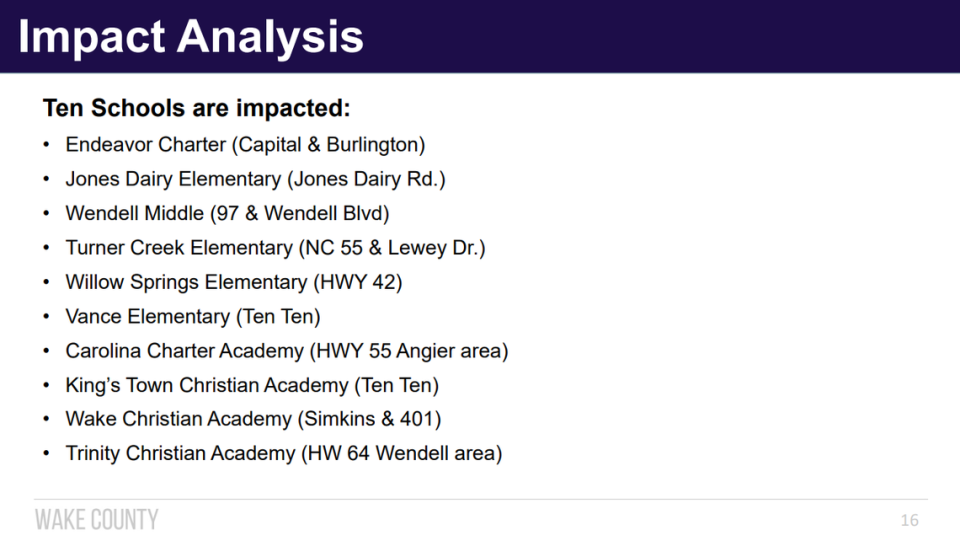Wake County considers new rule to cut down on student smoking and vaping
Months after student vaping forced a local high school to close half its restrooms, Wake County may take another step to keep young people from smoking.
County leaders are considering requiring new stores that sell tobacco and hemp products to be at least 1,000 feet from schools, parks, greenways, residences, and other tobacco and hemp retailers.
The rule would apply to the county’s unincorporated areas and to towns if their local governing boards adopt it.
Earlier this year, the Wake County Public School System asked the county and municipalities to do something about the proximity of tobacco stores to school grounds.
State law prohibits local governments from regulating the sale and distribution of tobacco products, so leaders are turning to land-use rules.
County planner Terry Nolan told the county commissioners Monday that, while distance might not be as big a deterrent as higher prices, “we have authority to control where land uses are able to go.”
“Our authority is quite broad in terms of using zoning and land-use regulations to benefit the public welfare,” Nolan said. “This is commonly used for sexually oriented businesses, and Wake County has an ordinance (for those businesses) that is very similar to this (proposed) tobacco and hemp ordinance related to distance.”
800 tobacco stores in Wake County
Wake County defines tobacco and hemp retail as any product that contains tobacco or nicotine; products that contain a certain level of THC, including Delta 8 and Delta 9; and products that contain Kratom, which is known to have addictive, opioid-like qualities. The definition also includes electronic devices that dispense nicotine, THC and other substances.
A 2022 survey found 1 in 8 high school students in North Carolina use a tobacco product, with vape pens or e-cigarettes the most popular product.
About 800 stores in Wake County sell tobacco products, including about 30 in unincorporated areas.
Apex, Fuquay-Varina, Knightdale, Rolesville, and Zebulon already require such stores to be 500 to 1,000 feet from schools when tobacco and hemp are the primary items being sold. Gas stations and grocery stores are excluded.
Raleigh and Cary do not have local regulations for tobacco and hemp retailers, and Nolan said many stores are close to schools. Broughton High School in Raleigh is under 400 feet from Tobacco Maxx on West Peace Street, she said.
Raleigh is in the early stages of reviewing what it can do regarding tobacco and vape stores near schools, said Pat Young, Raleigh’s Planning Director.
There are over 400 stores that sell tobacco in Raleigh and over 100 in Cary, according to the county’s Public Health Department. As of this year, there are over 1,500 hemp growers in the state, employing thousands of rural workers.
The sale of hemp and CBD was legalized in North Carolina last year even though the Food and Drug Administration and the Centers for Disease Control and Prevention have not extensively researched or approved some hemp products like Delta-8, which has health risks like hallucinations.
Immediate impacts of a new rule
The legal age for the purchase of tobacco products in North Carolina is 18, and any store employee found selling to underage customers can be charged with a misdemeanor. All stores must display a sign stating the law.
The legal age to buy hemp products is also 18 in North Carolina, and customers must submit an identification card.
Studies show that many underage teenagers get tobacco or hemp from older friends or stores that don’t always check for age and sell the products to underage customers illegally.
The local proposal could have the biggest impact on areas surrounding 10 schools on the county’s edge, including in or around Knightdale, Wake Forest, Wendell and Willow Spring, Nolan said. The area around Lake Myra Park south of Knightdale and Wendell, could also be affected.
The ordinance also would prohibit new tobacco or hemp stores in mixed-use areas, where schools are sometimes located. Instead, they would be restricted to business, heavy commercial, and industrial districts.

No existing businesses would be affected by the ordinance. If a school is built by a business selling tobacco, the store would be exempt from the ordinance.
The Wake County commissioners will discuss the proposed ordinance at their next meeting on Oct. 16.
Anna Johnson contributed to this report.

